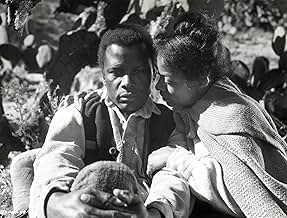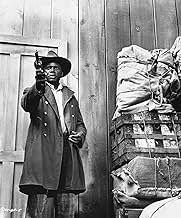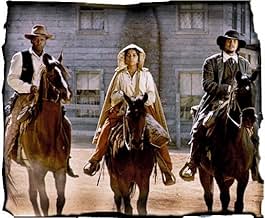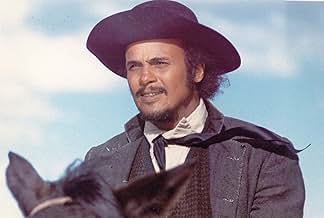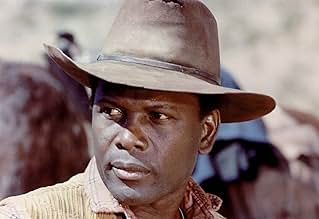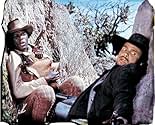IMDb-BEWERTUNG
6,6/10
2983
IHRE BEWERTUNG
Ein Fuhrunternehmer und ein betrügerischer Prediger helfen befreiten Sklaven, die von Billiglohnagenten im Westen verfolgt werden.Ein Fuhrunternehmer und ein betrügerischer Prediger helfen befreiten Sklaven, die von Billiglohnagenten im Westen verfolgt werden.Ein Fuhrunternehmer und ein betrügerischer Prediger helfen befreiten Sklaven, die von Billiglohnagenten im Westen verfolgt werden.
Kenneth Menard
- Little Henry
- (as Ken Menard)
Empfohlene Bewertungen
We tend to forget that in 1972, in the heart of the whole "blaxploitation" movement, that the very idea of casting African-Americans in traditional white roles was daring in and of itself. As such, Buck and the Preacher, starring Sidney Poitier (who also directed) and Harry Belafonte in the titular roles must have created quite a stir upon its release. The story is pretty standard for a western--a wagon train heading west, led by a tough-as-nails trail guide, is harassed by outside forces (usually bandits or American Indians), but in this case, the settlers are all freed slaves, and the "outside forces" are hired guns by the south, bend on stopping every black settler group, destroying their supplies (and murdering a few of their people), thus terrorizing them into returning to the plantations. Former military sergeant Buck (Poitier) will have none of that, and the slick-talking con man "Preacher (Belafonte), whose initial intentions may seem questionable, mans up and does the right thing, joining forces with Buck for a typical final showdown. A fun western, to be sure, but if you're looking for deeper social commentary that what has already been described, you won't find it. A traditional western with an African-American cast is daring as it gets in 1972, but don't let that keep you away. The original score by Benny Carter, heavy on the mouth harp and that weird pig-sounding instrument they use on Green Acres, will annoy the hell out of you yet stay with you for days.
I don't understand how someone could classify this film as a "comedy". It did have it's comedic moments, but no more than any other Western or Drama. Then that false comment ends up on the front page of the IMDb? Weird. This was a first rate Western by any standard. At a time when Hollywood had no interest in making such films. Blaxploitation films and comedies were the rules of the day. Poitier makes a great cowboy and fine director here. I suspect the reason this film is/was not more popular is that there were so few good guys of the White persuasion. The one fair and honest White man was the town Sheriff, who was quickly killed off by another White man for this very reason.
Buck and the Preacher was the first movie I ever saw about the black experience after the civil war that was centered on their migration west. I've seen this movie three times since it was originally shown, and have enjoyed it as much each time, while Buck, a no-nonsense Wagon Master played by Sidney Poitier takes his responsibilities very seriously. Naive ex-slaves are putting their very lives and fortunes in his hands in their attempt to find the American Dream after slavery. A subtly that many non-blacks do not understand about the relationship of blacks with each other is the historical mistrust and scheming that happens within the culture and still goes on today. That is what makes the meeting of Buck with the Preacher, played by Harry Belafonte Jr. so poignant. They are at opposite ends of the cultural trust scale, but they are forced to team up against a common enemy to secure their individual survival.
The Preacher, shiftless and scheming, and the only stereotypical character in the movie, is very well known to blacks, and not really as funny to blacks as non-blacks may sometimes think.
Buck and the Preacher was one of the first modern movies about black people to provide any depth to the characters, and also to present characters and subject matter that are not normally associated with the black experience. I found it entertaining as well as informative. A well-done move about an often ignored subject.
The Preacher, shiftless and scheming, and the only stereotypical character in the movie, is very well known to blacks, and not really as funny to blacks as non-blacks may sometimes think.
Buck and the Preacher was one of the first modern movies about black people to provide any depth to the characters, and also to present characters and subject matter that are not normally associated with the black experience. I found it entertaining as well as informative. A well-done move about an often ignored subject.
Poitier plays Buck, one of few blacks who are qualified to be wagonmasters. It is after the Civil War and he is helping escort former slaves into the west. This is not an easy task. They face nature, bounty hunters, racist settlers, robbers, and Indians. The movie is brutally honest with the hatred that these brave men and women faced, but the film has a strong sense of hope. They are not quitters, they raise money workers for sharecroppers along the way. Harry Belafonte has the most colorful role as The Preacher - a reformed thief who befriends Buck when given no one else to trust. The movie is bleak, yet hopeful, well-acted, and exciting. It deserves to be remembered with the best of westerns from that era. Much more historical importance than its predecessor, "Butch Cassidy and the Sundance Kid" with its sappy, happiness and handsome boy wonders. And Poitier rivals George Roy Hill as a director any day. Cool folksy-jazz score. Recommended to anyone who enjoys a fresh, historical angle with their westerns.
It's shortly after the abolition of slavery and Black people all over the south seek greener pastures where they don't have to be subjected to Jim Crowism. Some would head west with a wagon master showing them the way. And sometimes the greedy white people of the south wouldn't want to let their labor go so they'd send night riders after them to bring them back.
Buck (Sidney Portier) is a wagon master leading a group west. The Preacher (Harry Belafonte) is an opportunistic shuckster who finds himself a part of the Buck-led wagon train. The two of them have to be heroes in a sense in order to get this wagon train west.
I really appreciate this movie being made in the 70's when so many blaxploitation films were made. Instead of pimps, hoes, hustlers, and drug dealers, this movie is about positive black male figures in a western. Besides the terrible movie, "Posse," with Mario Van Peebles, I hadn't seen a Black western. I liked the history this movie presented (however dramatized), what it stood for, and the actors in it. Yes, I have seen better westerns--meaning more entertaining--but I can't readily recall a more significant western.
Buck (Sidney Portier) is a wagon master leading a group west. The Preacher (Harry Belafonte) is an opportunistic shuckster who finds himself a part of the Buck-led wagon train. The two of them have to be heroes in a sense in order to get this wagon train west.
I really appreciate this movie being made in the 70's when so many blaxploitation films were made. Instead of pimps, hoes, hustlers, and drug dealers, this movie is about positive black male figures in a western. Besides the terrible movie, "Posse," with Mario Van Peebles, I hadn't seen a Black western. I liked the history this movie presented (however dramatized), what it stood for, and the actors in it. Yes, I have seen better westerns--meaning more entertaining--but I can't readily recall a more significant western.
Wusstest du schon
- WissenswertesOn the advice of his future wife Joanna Shimkus, Sidney Poitier took over directorial duties from Joseph Sargent when he became dissatisfied with the film's point of view. As a result, this turned out to be Poitier's debut behind the camera and he would go on to direct eight more pictures.
- PatzerWhen Ruth blows out the flame in the lantern, there is a slight delay before the light goes out in the cabin and then another slight delay before the "moonlight" comes up.
- Zitate
Buck: Which way are you ridin', Preacher?
The Preacher: Well, that's not exactly settled in my mind yet.
Buck: Well, you got three possibilities.
The Preacher: Oh?
Buck: North, south or east.
The Preacher: What happened to west?
Buck: We're going west.
- Crazy CreditsOpening credits prologue: The Civil War was over and by law the slaves were freed. But when the promise of land and freedom was not honored, many ex-slaves journeyed out of the land of bondage in search of new frontiers where they could be free at last.
They placed their hopes in the hands of the few black wagonmasters that knew the territories of the West.
None of this came easy, for for not only did they have to overcome a hostile wilderness, but nightriders and bounty hunters were hired by persons unknown to hunt them down and turn them back to the fields.
This picture is dedicated to those men, women and children who lie in graves as unmarked as their place in history.
- VerbindungenFeatured in Dick Cavett Show: Folge vom 1. Mai 1972 (1972)
Top-Auswahl
Melde dich zum Bewerten an und greife auf die Watchlist für personalisierte Empfehlungen zu.
- How long is Buck and the Preacher?Powered by Alexa
Details
Box Office
- Budget
- 2.000.000 $ (geschätzt)
- Weltweiter Bruttoertrag
- 2.762 $
Zu dieser Seite beitragen
Bearbeitung vorschlagen oder fehlenden Inhalt hinzufügen


